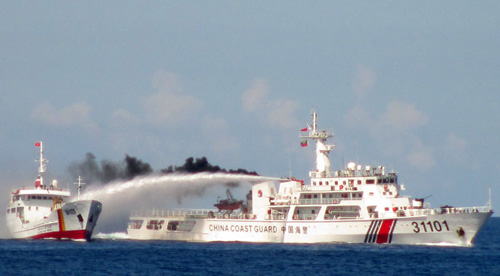(BGF) – Foreign Minister Wang Yi said that China wanted the US to “stop fueling provocations by relevant parties” in a telephone conversation with US Secretary John Kerry, as the China’s ECNS News reported. China also urged Washington to “stand firmly”, “be cautious in words and actions”.
China has become more aggressive in its actions over conflicts with Vietnam and the Philippines in order to claim its sovereignty over almost the whole of the South China Sea.
Click here to read the full article or visit the ECNS website.
Stop fueling maritime provocation, Beijing tells Washington
May 14, 2014 By Wang Fan
 Chinese maritime surveillance ships fire water cannon to Vietnamese fisheries surveillance ship (Photo Credit: Vietnamese’s Department of Foreign Affairs)
Chinese maritime surveillance ships fire water cannon to Vietnamese fisheries surveillance ship (Photo Credit: Vietnamese’s Department of Foreign Affairs)
Beijing described Washington’s latest remarks on the South China Sea on Tuesday as “inspiring belligerency” after US Secretary of State John Kerry said China’s use of an oil rig in its territorial waters was provacative.
Analysts said China left no doubt that it was clearly warning the United States to abandon “hypocrisy” and to stop publicly backing countries such as Vietnam and the Philippines on issues regarding China’s sovereign territory.
Foreign Minister Wang Yi told Kerry in a telephone conversation that China wanted the US to “stop fueling provocations by relevant parties”.
Beijing urged Washington to “stand firmly by its previous commitments, be cautious in words and actions” and observe the maritime situation around China in “an objective and fair manner”, Wang said.
Kerry said the US had no intention of judging when it came to the sovereignty of a territorial issue and Washington hoped that all parties concerned handled issues properly and maintained the peace and stability of the region.
Teng Jianqun, an expert at the China Institute of International Studies, said the US had already fully engaged itself in a range of problems that had flared up in the Asia-Pacific region, at the expense of its relationship with China.
Click here to continue reading.